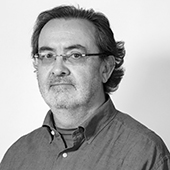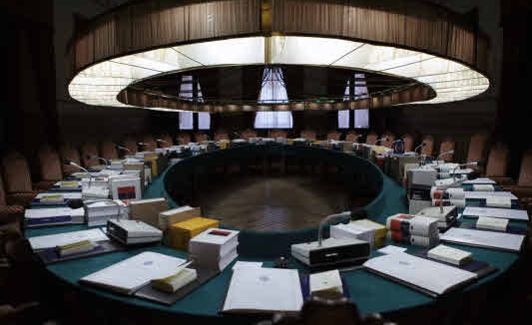Santiago Muñoz Machado, director of the RAE, writer and jurist /
The director of the Royal Spanish Academy publishes ‘Cervantes’, a definitive treatise of more than a thousand pages on the life, work and time of the prince of geniuses
Author of the ‘Exemplary Novels’, the life of Miguel de Cervantes was neither sweet nor exemplary. Womanizer, cheat, soldier of fortune, convict, exclusive and favorable to the expulsion of the Moors, he “gave a lot to Spain and received very little.” Santiago Muñoz Machado explains it, (Pozoblanco, Córdoba, 73 years old), director of the Royal Spanish Academy (RAE) and author of ‘Cervantes’ (Crítica), a 1,040-page biographical treatise on the prince of mills. Knowing that the portrait and manuscript of Cervantes preserved by the RAE are false, prompted him to write this monumental work seeking the truths where lies prevail.
-Is the life of Cervantes so mystified?
-Yes. It is an important motivation. One has been with Cervantes all his life and suddenly one finds incitements like those falsehoods. In the construction of the life and the bibliographical analysis of Cervantes there is a lot of speculation, nonsense and falsehoods, and it is interesting to clarify the essential elements. So I deal with his life, his work, the criticism of his work and his time. It is my most ambitious work in historical and literary matters. I have needed a decade of reflection and four years to write it.
-Your earliest reading of ‘Don Quixote’?
-As a kid, in high school and not in one of those abbreviated editions. I read it as God intended, full length. And I didn’t find it fascinating. For a student it is hard. As an adult I will have read it twenty times in a row, and many more partially. I always have it close.
-What is the most valuable lesson of Cervantes?
-His ability to endure a life that is not favorable in terms of human relations. Know how to overcome an unfair situation in regard to their career, the lack of recognition. And the ability to analyze the society of his time. He is a human being like any other. He had a very humble personal career, dedicated to not brilliant professions and yet he was exceptional in handling the pen. An overflowing imagination, an unusual quality to express things. Everything literary is enviable in his life, but in social and human relationships, it is unfortunate and sad.
-A disastrous life of yours?
-Yes. Nothing shiny. With bad luck, forced to leave Spain very young. He spends many years outside, either fighting or as a captive in an inhuman prison in Algiers. And when he comes back he has a lot of difficulties finding patrons, social relations, and a lot of marginality. He lives in a family environment that is not exactly the most glorious. He gave much for his country and received little in return. In his books he reflects situations from the 16th and 17th centuries with great subtlety, irony and an extraordinary skill in criticizing them.
Mystification
«There is a lot of speculation, nonsense and falsehoods about Cervantes»
-Were you aware of the importance of your work?
-At the beginning of the second part, Don Quixote tells Sancho that both, ‘their figures’, will be in the inns and in the taverns. And he also says in the prologue that the second installment is ‘waiting for it until the emperor of China’. So he is perfectly aware of the importance of his work. The first part sold well and went through several editions. Society and writers appreciate him, but a situation of great intolerance was generated towards a poor tax collector who suddenly became number one in literature. That is not well tolerated by those on the cusp of fame.
– Was he portrayed in his prologues as he was, or as a character?
-As it was. She left reliable clues later corroborated. He was convinced that when he died no one would write his biography and he was sure that other writers, especially the famous Lope, would be buried with full honors, which would not happen to him. He was releasing pills, fragments of his life in the prologues and dedications and sometimes using episodes of his life as fictional material. The problem is separating the truth from the creative, and therefore one should not tread too carefully.
Was your literary ambition to seduce or entertain?
– Entertain above all. He repeats that he makes novels to entertain, as he points out in the second part of ‘Don Quixote’, children, young people, and old people. To all the world. ‘Don Quixote’ was understood in the 17th century as a novel of ridicule, entertainment and fun. Then it turned out that it was much more than that. That it was a work of enormous depth and scope.
-Cervantes is often presented as a feminist, was he?
-It is said that he was a very liberal man, who considered women as a legal subject comparable to men and recognized all their freedom. But I think it is a bit of an exaggeration to say that he is the first feminist in our literature and to attribute to him a conception of women similar to the one we have today. It is true that some female characters are very free and interesting because of how it makes them express themselves.
Language Academy
«It would have been a stain not to admit Cervantes in the RAE, although it was far from being founded»
-English and French better calibrated your talent than the Spanish?
-It’s a bit like that. The first editions of ‘Don Quixote’, from 1605 to 1615, were very bad, plagued with typos, corruptions, interferences and interpolations by typesetter. And it was not corrected throughout the 17th century. The first important, careful and luxurious edition, with prints and engravings, was made by the English in 1738, a long century later. In Spain a noble edition was not made until 1780. And it was from the RAE, which made an effort to elevate the figure of Cervantes to where it deserved from 1770. A young academic, Vicente de los Ríos, made the first biography with research archive.
-Would they have admitted Don Miguel de Cervantes in the RAE?
-Of course. The Royal Academy was still a long way from being founded when he died, but I have no doubt. It would have been really a stain, a very large stain not to do it.
He was a curious and constant reader. What do we know about his library?
-Little bit. What appears in the expurgation of books that the priest and the barber do in Don Quixote. They are books that must have been part of his library or that he knew. In his work there are many references to books from his time that the force he had to have in his hands. From Antonio de Torquemada, for example, ‘The garden of curious flowers’ that he manages continuously, or the compilation of proverbs by Juan de Mal Lara, an intellectual and humanist from Seville who compiles all proverbs verbally.
– Was he a great novelist perhaps because he was a failed playwright?
-Failure is relative. Between 1585 and the end of the century he premiered several very successful and followed dramas in the theaters of Spain. But he left him to go collect taxes and supplies for the Spanish Army. When he returned, he himself says that he was already dominating the Lope de Vega theater. And it was very difficult to find a place in the shadow of Lope. He leaves it for that reason. He says there are no more birds in those nests. The birds had flown and it was time to move on to something else. Then he fortunately dedicated himself to stories, to narrative. What made him great?
The Plenary Hall of the Royal Spanish Academy. /
Allied with new technologies
Santiago Muñoz Machado has been at the head of the learned house for four years that “cleans, fixes and gives splendour” to our language, and he is satisfied with what has been done. He got the backing of the government by gently slamming his fist on the table for more resources and attention. His battle now is that the new technologies do not harm our language and are powerful allies and not enemies of the language that connects 500 million people
–He has been in the RAE for four years. His balance?
-I am happy. We have been able to move forward with traditional projects and renew ourselves. Our presence in society, in the media, and on social networks has improved a lot while maintaining our historical project. We have opened the house to projects to new programs of great interest, which have to do with the evolution of current technology and society.
-But he had to gently punch the table warning that the RAE is a matter of State and that it is our best cultural value and must be sustained
-I said it the first day and I repeat it whenever I can, because it is so. The best thing that Spain has is its language. And an institution that takes care, let’s say honorarily, of defending it, and that has a concert with 22 other academies from around the world, where some of the best intellectuals from each country are, who defend the language, and work on the projects that we tackle , which is a fantastic jewel that must be taken care of. Whoever doesn’t is underestimating the best cultural value we have.
–
The digital leap, which was not easy, has been happy.
–Happy in the part that we have completed so far: putting our linguistic tools and works at the service of citizens more easily, in a more accessible and more transparent way. Almost everything is done on that. We have come a long way. Now we have to move forward in ensuring that the new technologies, to the extent that they use the Spanish language, do not spoil it, fragment it, misuse or reduce its lexicon, disfigure its character, invade it with new forms, use grammar, manipulate it, not hit, ignore or violate it.
-What is the most immediate challenge of the house?
-There are several. We are working on the 24th edition of the Dictionary of the Language that we must present in 2026. We have begun a new stage with the Historical Dictionary, which is one of the apples of my eyes. I am very interested in his progress, because the RAE has been with him for a century in strict terms. I don’t mean that metaphorically, and not much progress has been made. I want to leave that more advanced project when I leave. But what my administration most symbolizes is LEIA (Spanish Language and Artificial Intelligence) and all the incorporation of artificial intelligence technology with language, which is one of the ones that will most immediately characterize the Academy of coming years.
www.hoy.es
Eddie is an Australian news reporter with over 9 years in the industry and has published on Forbes and tech crunch.

